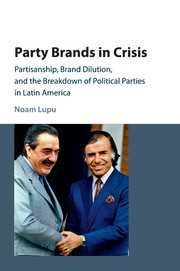 Party Brands in Crisis
Party Brands in Crisis Book contents
- Frontmatter
- Dedication
- Contents
- List of figures
- List of tables
- Acknowledgments
- 1 Why do parties break down?
- 2 Brand dilution and party breakdown
- 3 Explaining party breakdown across Latin America
- 4 Argentina: Peronism survives, Radicals collapse
- 5 Venezuela: AD and COPEI break down
- 6 Party brands and mass partisanship: experimental evidence
- 7 Party brands and mass partisanship in comparative perspective
- 8 Parties, partisanship, and democracy: conclusions
- Appendix
- Bibliography
- Index
6 - Party brands and mass partisanship: experimental evidence
Published online by Cambridge University Press: 18 December 2015
- Frontmatter
- Dedication
- Contents
- List of figures
- List of tables
- Acknowledgments
- 1 Why do parties break down?
- 2 Brand dilution and party breakdown
- 3 Explaining party breakdown across Latin America
- 4 Argentina: Peronism survives, Radicals collapse
- 5 Venezuela: AD and COPEI break down
- 6 Party brands and mass partisanship: experimental evidence
- 7 Party brands and mass partisanship in comparative perspective
- 8 Parties, partisanship, and democracy: conclusions
- Appendix
- Bibliography
- Index
Summary
In the early 1980s, many Latin American voters identified with established political parties. But during much of the 1990s, Latin Americans gradually became less attached to these parties. Attachments with both of Argentina's oldest parties declined over the course of the 1990s and early 2000s. In Venezuela, voters felt less and less affinity with that country's main parties during the 1990s. Declines in mass partisanship made these established parties susceptible to voters' short-term retrospective evaluations and breakdown.
My branding model of partisanship posited that these declines in mass partisanship resulted from the parties diluting their brands. Case studies showed that during the 1990s, political elites in Argentina and Venezuela implemented policies that were inconsistent with the traditional positions of their party, provoked intraparty conflicts, and formed strange-bedfellow alliances with traditional rivals. I argued that these behaviors diluted the brands of their parties and showed that they were indeed associated with eroding voter attachments in the aggregate.
Still, we cannot know for sure from these aggregate relationships whether my individual-level branding model is at work. Most studies of mass partisanship implicitly assume that party behavior has no effect whatsoever on individual party attachments. So there is in fact good reason to be skeptical. We need to test directly whether party behavior informs partisanship at the individual level.
I posited that as major parties converge, voters become unable to distinguish one party brand from another, weakening partisan identities. In other words, when rival parties signal convergence in salient ways – say, by forming an alliance – the difference between their brands shrinks, making it less likely that voters will feel a comparative fit with one over the other. In Argentina, bipartisan legislative support, repeated attempts to form coalition governments, and policy convergence between the PJ and UCR were associated with eroding attachments with both parties. When AD and COPEI similarly converged, entered into coalition, and cooperated to forestall electoral losses, Venezuelan voters' affinities with the parties similarly weakened. Thus, I expect party convergence to weaken partisanship, whereas divergence strengthens it.
In order to test the effect of party convergence on partisanship, I embedded an experiment in a 2009 survey of voters in Argentina.
- Type
- Chapter
- Information
- Party Brands in CrisisPartisanship, Brand Dilution, and the Breakdown of Political Parties in Latin America, pp. 135 - 151Publisher: Cambridge University PressPrint publication year: 2016


